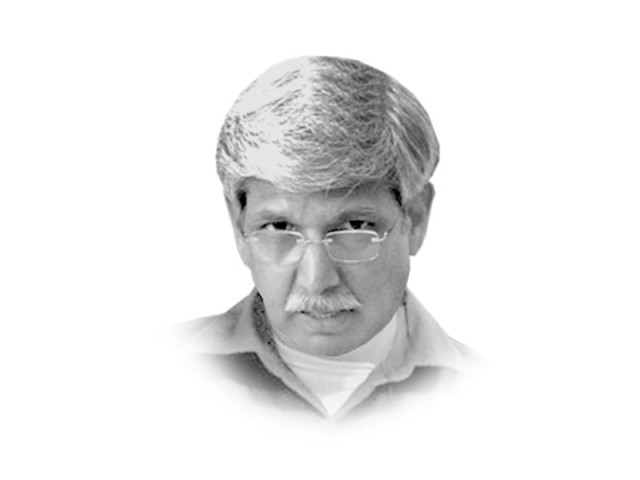It’s the politics, stupid
When corps commander, DG Rangers, given empowerment to deal with crime, step on some political toes, toes exclaim foul

The writer is a political and security analyst who retired as an air vice-marshal in the Pakistan Air Force
Most importantly, the way politics is practiced has not changed even though the environment in which it operates has. Forces of conventional politics that have perpetually dominated the scene are in serious contention against those that demand change. The opposing forces to conventional politics, for the moment, are the military and an unstated sentiment among the people that finds expression through their vocal support of what the military is doing in the circumstances. The paradox consists of the politicians who are meant to be the voice of the people but are the last ones to give meaning to it since the status quo is where their personal and institutional interests merge. It remains a classic case of systemic hypocrisy. Somewhere in there, both the state and the nation are inordinately screwed for good measure.
Here is the quandary. The provinces are being run by parties other than the one at the centre; except of course Punjab. If Punjab, too, were to simply disregard what the elder brother ordains, there is precious little that the centre can do. Which really means that the centre is practically impotent in the matter of the provinces and how they run their affairs. The 18th Amendment ensured that. The federation cannot even deploy a force or apply governor’s rule unless a province, via its legislature that via its chief minister, so requests. Sindh, thus, is safe from a challenger for the moment. For Sindh, Rangers are only an irritant, just making the province and the two powerbrokers look bad. Interestingly, Sindh must also concur if the centre was to fall and order an early election. None of these is likely to happen to close the loop and therefore each sits safe at their location. Such is the craftiness in the formulation of the 18th Amendment.
Consider: the centre, the people and institutions — all kinds: the judiciary, law enforcement, legislatures, the military, the accountability bureaus, the FIA, anti-corruption units — detect humungous corruption making the rounds in a province, read Sindh, and can do practically zilch about it. That is why, when the corps commander and the DG Rangers, given their empowerment to deal with crime and terror through a province-centre consensus, begin to step on some political toes, the toes exclaim foul. Perhaps so. Yet when provincial patronage shields political patronage of crime and corruption, the cesspool ends up nourishing agents of terror, who can also double for crime. In their search for the terror-crime-money nexus, the Rangers chanced upon their sponsors in politics; those who rule the province — cities and villages both, who will instead rather halt the process of inquisition. Damn the terror. Work that out within the realm of democracy under the shadow of the 18th Amendment.
Surely, were these democrats to revert to the electorate for a fresh mandate despite their muddied credentials, they will be returned as per convention, validating that long-held proclamation that people know the best. The manipulation of the political system is so completely crafted that these corrupt politicians are the only names on the ballot. In the name of democracy, we keep returning crooks to parliament, and that completes the circle of sustenance of a system which continues to cream off the nation’s riches without check. In the days past, this was the trigger for revolutions; now we seek stability for economic gains, purportedly. People are only unwitting accomplices to the process. The system is bad; democracy is not. Removing democracy is not the answer, changing the political system is. Let us bring our constructive intellect to the point of discussing what, how and who should wring the changes so that the political system opens up a bit and tweaked away from the mafias who retain their singular stranglehold over the system.
One option is to restructure what we have, making it incumbent upon political parties to resort to some foundational principles; holding leaderships and governing bodies accountable for implementation, and making representation on the boards wide based and proportionate. A system of implementable political audit where fidelity in party membership, its funding and the absence of conflict of interest is assured; where political offices are split so that whoever is in government may not hold political office too. Or, a change in the structure of parliament where non-political agents, such as the judiciary, bureaucracy and the military can recommend members to parliament from within the civil society on an enhanced technocrat quota, with specialised qualifications in the fields of governance that can assist the government in policymaking; these should be over and above those who make it through the traditional process. Only such structural incumbencies will force these political parties to think differently.
Will parliament, composed of conventional politicians seeped in self-interest, ever agree to bring in the legal statutes that shape a different kind of politics? Surely not. Shall then the non-political offices in the government, along with representatives of the civil society, prepare proposals, and using this quasi-democratic moment in our political existence, ask the government to reform and restructure the political system to bring about greater fidelity, credibility and efficiency in political functioning? Let those who comment take on the what, who and how of what really chokes our socio-political wellbeing. Civil-military tensions are a beaten horse that can hardly be the cover for systemic failures. At least we should do better and unshackle our wisdom to help chart a better future.
Published in The Express Tribune, July 11th, 2015.
Like Opinion & Editorial on Facebook, follow @ETOpEd on Twitter to receive all updates on all our daily pieces.













COMMENTS
Comments are moderated and generally will be posted if they are on-topic and not abusive.
For more information, please see our Comments FAQ